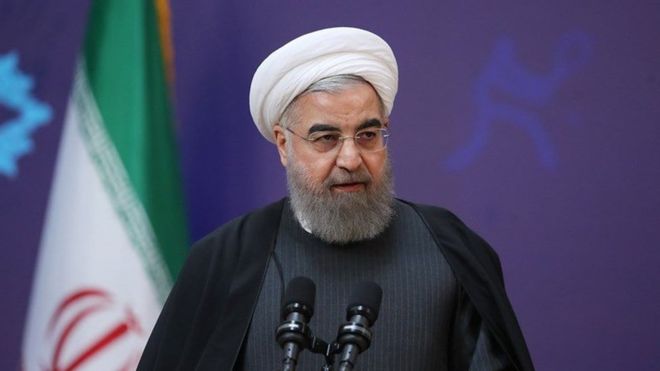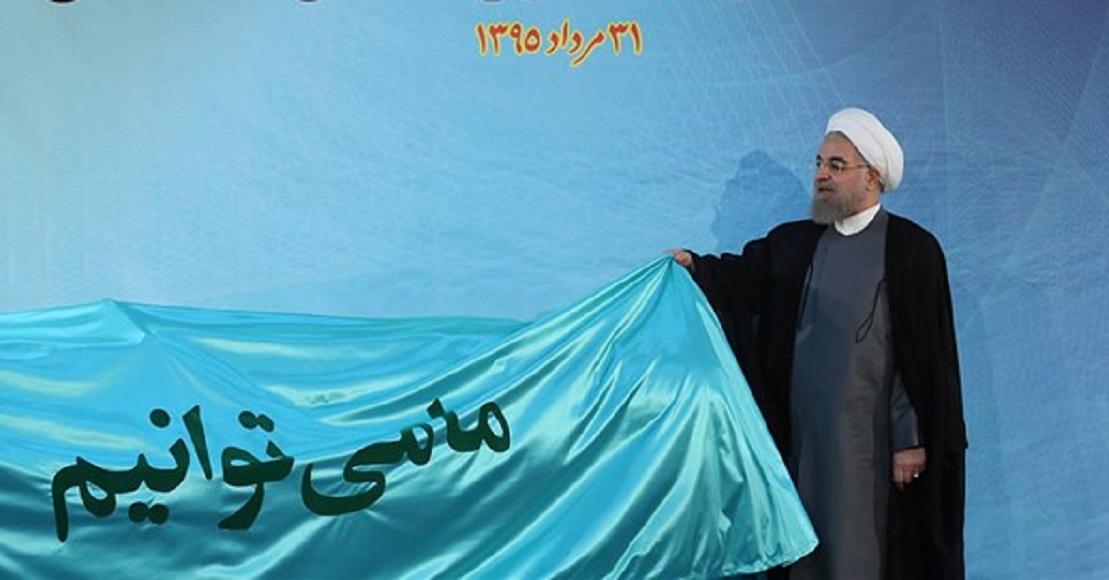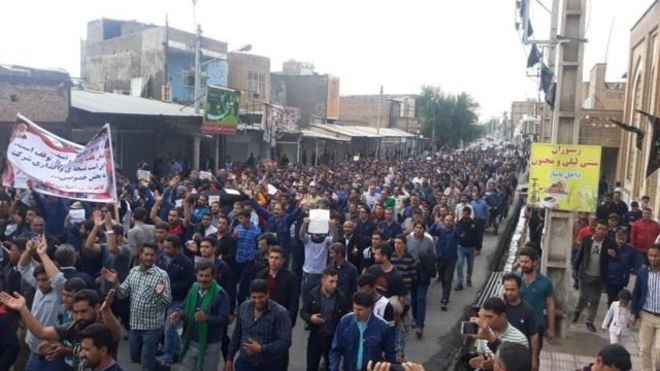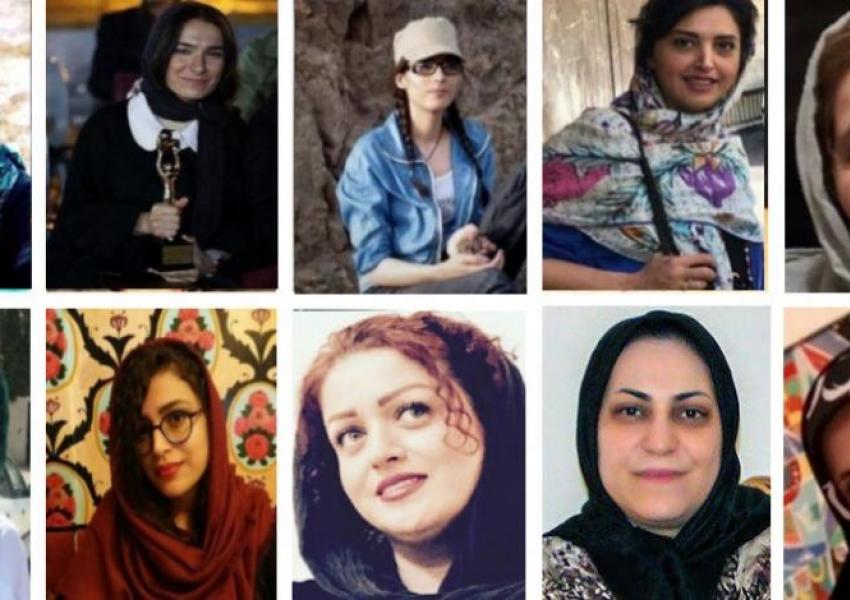
The third step to take place in reducing its obligations in the nuclear deal
The editorial of Jahan Sanat deals with why Iran will take the third step in reducing its obligations in the nuclear deal (JCPOA).
On paper, there was still hope, so much so that even the French President Macron imagined it would be different this time. That is why he expressed hope that there would probably be a meeting between Donald Trump and Hassan Rouhani in the near future. However, in actuality, nothing has changed.
There is still suspicion concerning Trump’s intentions among the leaders of Iran. None of the decision-makers believe that Iran should change its positions and negotiate with the United States while it insists on its preconditions and continues to impose sanctions on Iran.
Currently what is important for Iran is to alleviate the pressure of the US sanctions. As a result, Iranian officials have opted for using the JCPOA’s terms to reduce their obligations, thus pressuring the European parties to the deal to find ways for Iran to gain its benefits.
Zarif went to France to share Iran’s views regarding France’s proposal directly with leaders of Germany and England. Obviously, Germany and England are not optimistic that the U.S. will reduce its sanctions against Iran, but still, they have to find ways to improve relations with Iran and preserve the JCPOA in a way that Tehran remains committed fully to its obligations.
On the other hand, Tehran has carefully observed the US measures towards North Korea. It is obvious that Trump’s repeated meeting with the North Korean leader Kim Jong-un has had no practical outcomes, and the American side has not granted any concessions to Pyongyang.
It can be taken for granted that Iran will take the third step in reducing its obligations in the JCPOA. This is in light of the fact that no conclusion has been reached in the ongoing discussions between Iran and Europe. This means that Europe cannot have any practical impact on Iran’s future actions in regards to the JCPOA.
Jahan Sanat – August 28
On why the recent arrests in corruption cases will have little impact
The editorial of Hamdeli elaborates why the recent arrests made by the Iranian judiciary to fight corruption will not have much effect in combatting the systematic corruption in Iran.
The poverty of nations is rooted in political corruption and is due to the rule of the few over the many. The fundamental solution to fight corruption is to move to a strong democracy in which civil society and other groups that are independent of the government can oversee political power. All cases of corruption that have been discovered are related to groups affiliated with those in political power.
Issues that make systematic corruption possible are still in place: mechanisms of distributing Forex resources at a government rate, secret subsidies, rent-seeking, conflict of interests, lack of transparency and the free flow of information, as well as different kinds of quotas, guaranteed purchases, and sanctions. That is why arresting these defendants on charges of corruption will not disrupt the existing mechanisms in this regard.
What is more, the judiciary and the establishment do not offer any explanations concerning the rise of corruption in Iran, and its dimensions, nor provide any insight into the legal loopholes that might cause corruption, its systematic nature, and the lessons learned from these corruption cases. In fact, the media has no access to the details of the cases. Moreover, when the defendants are sentenced to be either executed or imprisoned, some generalities are released about them.
Those in political power and their media propaganda machine insist on reducing systematic corruption to isolated issues such as the defendants belonging to a certain faction – mainly “reformists”, “liberals”, and “neo-liberals” but they have rejected any affiliation of the defendants with the revolutionary current. However, in actuality, the defendants are actually from all factions, and some of them have even pretended to be extremely “revolutionary”.
The abovementioned points prove that the arrests made will not have any meaningful impact on systematic corruption in Iran. Rather, it proves what people already know: that corruption is deeply rooted within the establishment.
Hamdeli – August 27
Arresting automakers, small steps in fighting corruption
The editorial of Mardomsalari explains why systematic corruption and inefficiency in the auto industry will not be rooted out by simply arresting a few managers from that industry.
Last week, the arrest of Iran Khodro’s managers made the headline in Iranian media. Along with the news of several senior managers in SAIPA being arrested and two lawmakers on the charge of disrupting the automobile market. These arrests raise some serious questions: why has the auto-industry become so corrupt? Why does Iran’s automobile market suffer from a crisis when there is volatility in the country’s foreign relations? Why are automobiles so expensive and of so low quality?
Iran’s economy has a rentier nature, because of which it has turned into governmental capitalism. The rentier structure has created a non-transparent system controlled by the government itself.
What is more, the rentier government has a monopoly over profitable industries, and this has resulted in low productivity. For example, in Korea’s Hyundai, 75 vehicles are manufactured per worker; whereas, in Iran Khodro and SAIPA, 7 vehicles are manufactured per worker. This low productivity is because of the government’s monopoly over manufacturing automobiles.
Government industries are prone to corruption. This issue has existed after the revolution, regardless of which government has been in power. Government industries and factories do not see the need for improving the quality of their products and decreasing costs, as there is no competition.
Corruption, under any condition and by any official, must be prosecuted. Nevertheless, judicial cases cannot replace reform in the structure and rooting out corruption. Furthermore, the public’s problem with the auto industry is not related to corruption, but the inefficiency of this industry (low quality, high-prices, etc.).
Finally, it must be mentioned that bribery and mafias are not inherent, but the outcome of a diseased structure. The problems of this industry are not just related to the managers who have been arrested and they can not be resolved by just replacing individuals. The arrests made by Iran’s judiciary is only a small step in reforming an inefficient structure.
Mardomsalari – August 29
Tools for alleviating poverty
The editorial of Jahan Sanat deals with ways in which the Iranian government can solve the problems of poverty and soaring prices in the country.
In 2015, statistics were published on the poverty line, showing that by the standard definition, 37% of Iranian households are under the poverty line. Under the current circumstances and given the fact that the rate of Iran’s Forex has tripled and the value of the national currency has severely dropped, this issue finds new dimensions.
It seems that as a result of the economy’s dependence on imports, the Iranian economy has a close relationship with the Forex rate, which has resulted in an increase in the costs of livelihood. Under these circumstances, the fact that the Forex’s price has tripled and the public’s basic requirements are provided through imports, the households’ purchase power has enormously decreased, creating the necessary grounds for the poverty line to go up.
One of today’s problems in Iran’s economy is the accumulation of wealth in certain groups, resulting in a monopoly of 1% of individuals and entities over 70% of banking deposits. From this perspective, one of the fundamental solutions for decreasing poverty can be the redistribution of wealth among low-income families, through taxes and subsidies which can result in redirecting wealth towards those families.
On the other hand, the government can provide for people’s requirements through smart cards, making the necessary goods available to them through such a method. If this happens then the government can control the price of essential goods more accurately.
While the government talks of allocating $14 billion for providing essential goods last year, rent-seeking and corruption are rooted in the country’s economy, as a result of which the prices have greatly increased. This shows that changing the current method of distributing wealth can also be a big step in controlling and decreasing prices.
Jahan Sanat – August 25

Confusion in foreign policy:
Rouhani keeps changing his mind on meeting with Trump

A day after President Hassan Rouhani said he was “ready to meet with anyone for the people’s sake”, he refused to have any meeting with the US President Donald Trump, saying any changes in US-Iran relations depends on the US lifting its sanctions.
“If anyone wants to take a picture with Hassan Rouhani, this is not possible unless he stops imposing all the cruel sanctions and respects the rights of the Iranian people,” said Hassan Rouhani in his speech.
Rouhani continued, “We have not forgotten those who imposed sanctions on our people and committed economic terrorism”, adding, “We change our behavior as soon as they repent.” He emphasized, “Our policy is a comprehensive interaction with the world.”
In the same vein, Iran’s Foreign Minister Mohammad Javad Zarif said he has told French President Emmanuel Macron “a meeting between Iran’s President and Trump is unthinkable.” In an interview with IRNA, Zarif denied Macron’s words of Iranian authorities’ approving a meeting between Hassan Rouhani and Donald Trump. He noted the U.S. administration has violated all the agreements that were reached after long dialogues between the two countries.
Mohammad Javad Zarif also accused Europeans of wriggling out of their commitments in the JCPOA, saying Europeans need authorization from America in order to fulfill their commitments.
Meanwhile, a number of “principlists” and hardline newspapers in Iran lambasted President Hassan Rouhani’s administration after his Foreign Minister, Mohammad Javad Zarif, made an unexpected visit to France.
The “ultra-conservative” Kayhan Daily accused Rouhani and Zarif of entering into “wrong negotiations arbitrarily.” It called Zarif’s trip “improper”, adding that France’s proposal of negotiating over Iran’s missile program and its regional activities is actually the repetition of those 12 conditions that the U.S. administration had previously set for Iran in order to negotiate with this country.
The hardline ‘Sobh-e No’ daily slammed Zarif, emphasizing that “having hopes in Europe is basically a mistaken strategy” which Rouhani’s government keeps following.
BBC Persian
Radio Farda
Rouhani lies about economic conditions in Iran

In strange – even shocking – remarks, Iranian President Hassan Rouhani claimed that according to statistics, all economic indicators show that the conditions are much better than last year. Even though it is not clear to which statistics, he is referring to and what he means by economic indicators, the cases that Rouhani himself has raised are the inflation rate, conditions in the stock market, non-oil exports, and conditions in the market.
The Iranian president has said that statistics regarding inflation, non-oil exports, and growth in the stock market (140%) in recent months show that the public’s confidence in the economic market has increased compared to last year. He concluded “America isn’t victorious; it has been defeated. We have triumphed.”
Rouhani’s recent strange remarks are made at the time when the pressure of sanctions has even increased more in recent months. A while ago, he had even claimed that the Iranian people have found peace during sanctions!
Nevertheless, despite Rouhani’s sweet promises, the economic record of his government has been one of the worst in the history of Iran.
Perhaps, the most palpable economic indicator for people is the inflation rate. According to the Statistics Center of Iran, the point-by-point inflation for July 2019 reached 41.6%, while the inflation rate for foods, beverages, and tobacco was 56.6%. It means that each household has spent 41.6% more for purchasing goods and services this year.
What is more, the official reports show that the price of land in Tehran has had a 176% increase, while rents have gone up by 35%. The Ministry of Industry, Trade, and Mining recently announced that the prices of 55 essential goods considerably increased in June 2019, going up by 313%.
People’s livelihood basket has doubled, reaching 7.5 million tomans for a family of 3 or 4 per month; Iranian workers and retirees receive 2 million tomans per month. The costs of living have gone so high that according to labor activists, many retirees have to do low-level jobs – and even beg – to be able to provide for their families.
Apart from inflation, the recession too has increased in past months. What has happened during the past 5 months is indescribable, and even the government’s statistics indicate the deterioration of the economy in the country.
Now amidst this chaos and with the dire future that Iran has created for millions of Iranians, Hassan Rouhani smiles and lies to the people and talks of improving economic indicators and the people becoming more and more peaceful!
Kayhan London
The judiciary chief lashes out at workers: ‘They pursue other goals in the name of labor protests’

With the continuation of worker’s protests in factories and manufacturing units or in front of government buildings or the parliament in recent months, what Iran’s Judiciary Chief Ebrahim Raisi has said was more like declaring war against labor activists.
Ebrahim Raisi has lashed out at workers, saying, “They pursue other goals in the name of labor protests.” He made this remark four months after arresting labor activists during their assembly on International Workers Day and issuing heavy prison sentences against them.
In a meeting with parliament members, Raisi underscored that workers’ concerns are “understandable” and their problems need to be resolved, “but some have other goals in mind when covering labor issues.” He added the workers who “truly” protest because of their problems should be appreciated, but “workers themselves should stand up to those who contaminate those protests.”
Raisi’s remarks against labor activists were made while both the government and the judiciary have confronted workers’ protests in recent months through security confrontations, sackings, summonings, and arresting workers in factories and manufacturing units; and at the same time, issuing imprisonment and lashing sentences for labor activists.
9 workers of Haft Tapeh Sugarcane Factory, for example, were sentenced to 8 months of discretionary imprisonment and 30 lashes by the initial court. They were criticized for “holding an illegal assembly in order to change the management [of their factory] as well as to release Esmaeil Bakhshi” during his court session.
Esmaeil Bakhshi, a workers’ representative, was taken into custody when he participated in labor protests in southern Iran last winter. Bakhshi was arrested for the second time after talking about his torture in jail. The arrest was made after his coerced confession was aired on Iran’s state TV.
Meanwhile, it can be predicted that with Raisi’s remarks about the need for workers to “stand up” to labor activists, Basij forces in more than 2500 manufacturing units will become more active than before.
BBC Persian
Radio Farda
Iran is the biggest prison in the world for women media activists;
Iranian officials deny existence of mass graves

Reza Moini of Reporters without Borders warned against a new wave of summoning and arresting women reporters and citizen-journalists in Iran, saying that Iran has become the biggest prison in the world for women media activists.
According to the statement of Reporters without Borders, Iran was previously one of the five biggest prisons for journalists in the world but is now the biggest one. Moini has also demanded that UN Special Rapporteur on Iran should immediately call for the release of these prisoners in Iran.
According to this organization, 10 women reporters and citizen-journalists have been arrested in Iran. ‘Disseminating falsehood, insulting the sanctities and authorities, and taking measures against national security’ are charges that are routinely brought up against journalists and reporters in Iran.
Earlier, Reporters without Borders had issued a statement, condemning the efforts of Iran’s judiciary and security organizations to influence the Persian-speaking media abroad by putting pressure on the families of reporters and journalists in Iran. This organization had added that more than 50 journalists abroad have been threatened in this way by Iran’s security organizations. In addition, Iran had arrested reporters with dual nationalities, accusing them of espionage.
Amnesty International too issued a statement on the occasion of International Day of the Victims of Enforced Disappearance, saying that Iranian officials systematically conceal facts regarding thousands of political prisoners who were executed through extra-legal executions in 1988.
The Amnesty International statement mentions, “Thousands of the victims’ deaths remain unregistered and, across the country, there are thousands of missing bodies buried in undefined mass graves. For more than 30 years, the Iranian authorities have failed to officially acknowledge the existence of these mass graves and concealed their locations causing immeasurable suffering to families who are still seeking answers about their missing loved ones.”
Iran International
Radio Farda
